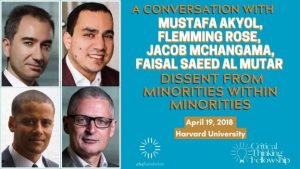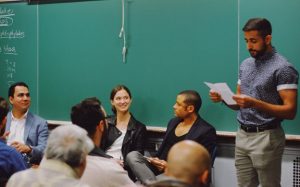Defending the Bulwark of Liberty During the “Global Free Speech Recession”: Author Jacob Mchangama on What We Can Learn from the History of Free Speech
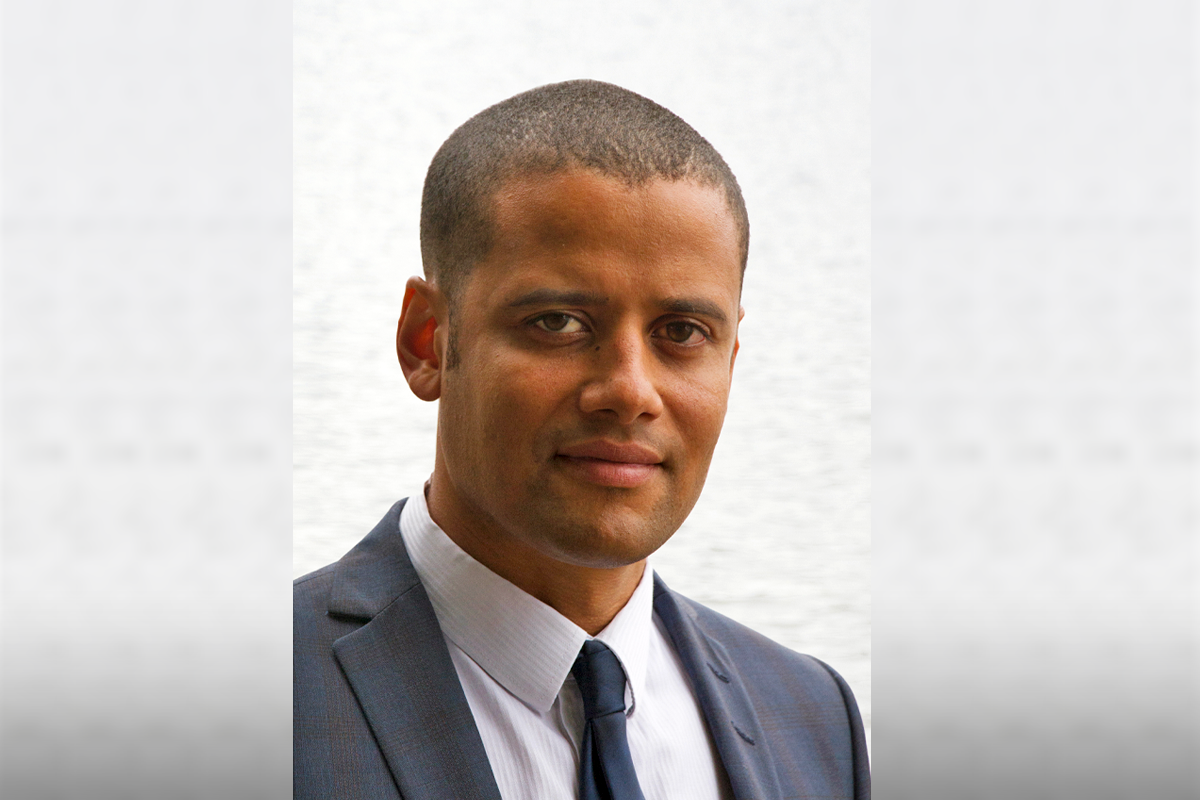
Jacob Mchangama, author of 'Free Speech: A History From Socrates to Social Media'
Published 8/29/2022
Jacob Mchangama is a lawyer, writer, and advocate who founded the think tank Justitia to champion human rights, free speech, and the rule of law. He produced and hosted the podcast Clear and Present Danger: A History of Free Speech and is the author of the recent book Free Speech: A History From Socrates to Social Media. He has also appeared at two of our Critical Thinking Fellowship events as a speaker. Below, we caught up with him after the publication of his book to discuss what we can learn from the history of free speech, what he calls the current “global free speech recession,” and why free speech matters to all of us.
Though written before the event, this blog, coming in the wake of the attack on Salman Rushdie, is an inspiring call to arms in defense of free speech at a time when it is under serious threat.
*The opinions in this blog don’t necessarily reflect those of AHA Foundation*
AHA Foundation: Thank you for speaking with us, Jacob. Could you start by telling us about yourself and your work?
Jacob Mchangama: I’m a human rights lawyer who founded the independent think tank Justitia back in 2014. Today most of my work consists in directing our Future of Free Speech Project, an ambitious attempt to foster a vibrant global culture of free speech in both the analogue and digital spheres.
AHA Foundation: Your podcast Clear and Present Danger and your recent book both detail the history of free speech and why it matters. How did you come to be so interested in free speech?
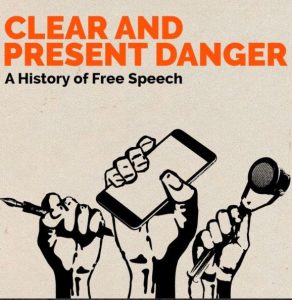 Jacob Mchangama: I was born and raised in Denmark—one of the most liberal, secular and egalitarian countries in the world. For much of my life I took free speech for granted. It was just the air I breathed. But dramatic events made me realize that free speech is both much more precious and much more fragile than I had imagined.
Jacob Mchangama: I was born and raised in Denmark—one of the most liberal, secular and egalitarian countries in the world. For much of my life I took free speech for granted. It was just the air I breathed. But dramatic events made me realize that free speech is both much more precious and much more fragile than I had imagined.
In 2005 Denmark became the epicenter of a global conflict of values over the relationship between free speech and religion when a Danish newspaper published cartoons of the prophet Muhammad. The reaction was not angry letters to the editor but coordinated terrorist attacks. Journalists and cartoonists, one of them a friend of mine, had to live with round-the-clock security. Suddenly journalism and satire had become a matter of life and death.
What I didn’t realize at the time was that the cartoon affair was but a flashpoint in a wider global free speech recession that is still wreaking havoc across the globe today—with grave consequences for the ability to speak out on issues that many of us would see as mundane. My own father runs an NGO in the Comoros, an African island nation in the Indian Ocean. In 2015 he organized a strike to protest power cuts and political corruption. The response of the government was to arrest him on charges of “incitement to hatred.” So free speech has been a red thread throughout my life and work.
AHA Foundation: In as brief an outline as possible, could you tell us about the history of free speech and the state of free speech today?
Jacob Mchangama: The roots of free speech are ancient, deep, and sprawling. The Athenian statesman Pericles extolled the democratic values of open debate and tolerance of social dissent in 431 BCE. In the 9th century CE, the irreverent freethinker Ibn al-Rawandī used the fertile intellectual climate of the ‘Abbāsid Caliphate to question prophecy and holy books. In 1582 the Dutchman Dirck Coornhert insisted that it was “tyrannical to….forbid good books in order to squelch the truth.” Denmark became the first state in the world to abolish any and all censorship in 1770.
Yet, almost invariably, the introduction of free speech sets in motion a process of entropy. The leaders of any political system, no matter how enlightened, inevitably convince themselves that now freedom of speech has gone too far. Autocratic oligarchs disdainful of sharing power with the masses twice overthrew the ancient Athenian democracy. Hardening laws against apostasy and blasphemy curtailed the most daring freethinking in medieval Islam. In the Dutch Republic of the 16th century, Coornhert was exiled and his writings banned. And Denmark’s experiments with press freedom were short-lived as absolutist rulers took back control of the printing presses.
In fact, the phenomenon of free speech entropy is as relevant today as it was 2,500 years ago, as we are witnessing the dawn of a free speech recession.
No doubt historical champions of free and open discourse of previous centuries would regard the 21st century as an unprecedented golden age of free speech. They would marvel at what people in much of the world can freely and immediately discuss, across time zones and borders, with no looming inquisition or corps of censors. At a global level, the principle of free speech has been transformed into an international human rights norm, and its practice has been aided by advances in communications technology unimaginable to previous generations. But despite the unprecedented ubiquity of speech and information today, the golden age is coming to an end. In fact, the phenomenon of free speech entropy is as relevant today as it was 2,500 years ago, as we are witnessing the dawn of a free speech recession.
AHA Foundation: Why is it so important to defend free speech? What is free speech good for? What do you say to those who advocate for censoring hateful ideas?
Jacob Mchangama: Free speech is, as the 18th century radical Thomas Gordon put it, the “bulwark of liberty.” It is also essential for the pursuit of truth, justice and accountability. Unfortunately, many people think that freedom of speech has become a weapon that can be used against democracy and vulnerable minorities in our digital age.
Free speech may well be the most powerful engine of equality ever devised by humankind.
Historically, the opposite is true. History demonstrates that free speech, equality, and justice go hand in hand. These values are mutually reinforcing, not mutually exclusive. More broadly, the idea that free speech perpetuates unequal power relations and that restrictions on this freedom are needed to level the playing field is deeply misguided. In fact, free speech may well be the most powerful engine of equality ever devised by humankind. Or to quote the great abolitionist Frederick Douglass “[t]he right of speech is a very precious one, especially to the oppressed.”
Around 2,500 years ago the Athenian democracy, however imperfect by modern standards, gave birth to the idea of free and equal speech. Ever since, the fight for free speech has driven the long and often bloody struggle to expand equality and justice to the poor, to women, and to religious, racial, and sexual minorities.
People like Frederick Douglass, Olympe De Gouges, Mahatma Gandhi and Nelson Mandela saw free speech as a crucial weapon against white supremacy, misogyny and colonialism. And they paid a high price for speaking truth to power.
AHA Foundation: What are the main threats to free speech today?
Jacob Mchangama: As I mentioned, despite living in a golden age of free speech by historical standards, we are facing a free speech recession.
The global club of free democracies is shrinking fast. As in ancient Athens, aspirational autocrats—from Orbán in Hungary to Modi in India—view freedom of speech as the first and most important obstacle to be cleared on the path to entrenching their power. In parts of the Islamic world, blasphemy and apostasy are still punishable by death, whether enforced by the state or by jihadist vigilantes.
The global free speech recession even extends to liberal democracies, whose governments are fearful of the consequences of disinformation and hostile propaganda spreading uncontrollably among the masses through new technology, and where academic and cultural institutions are internalizing the idea that the values of free speech and equal dignity are sometimes mutually exclusive rather than mutually reinforcing.
Read More: Ayaan Hirsi Ali Defends Western Freedoms and Ideals
AHA Foundation: What are the most important lessons to be learned from the history of free speech?
Jacob Mchangama: The fundamental disagreement about free speech among democrats in the digital age can be boiled down to two opposing conceptions stretching back to antiquity. An egalitarian conception of free speech stresses the importance of providing everyone with a voice in public affairs regardless of their status, wealth and education and has its origins in the Athenian democracy. An elitist conception, on the other hand, prefers a public sphere mediated by institutional gatekeepers who can ensure the ‘responsible’ diffusion of information and opinion and has its origins in Roman Republicanism.
The tensions between egalitarian and elitist ideals have dominated the history of free speech ever since, as mediums have changed and technology has advanced, from the printing press to the telegraph, the radio and the internet. Outbreaks of elite panic often reflect real concerns and dilemmas—without viral disinformation, the attack on the Capitol on January 6th might never have occurred and the response to COVID-19 might have been more efficient. But elite panic often results in policies that are likely to worsen the problems they were intended to solve.
Liberal democracies must come to terms with the fact that in the digital age, citizens and institutions cannot be effectively shielded from hostile propaganda, hateful content, or disinformation without compromising their egalitarian and liberal values.
Past attempts to rid the public sphere of ideas that authorities or elites considered extreme or harmful have tended to exclude the poor and the propertyless, foreigners and women. Until relatively recently in historical terms, those in power have deemed people in these categories too credulous, fickle, immoral, ignorant, or dangerous to have a voice in public affairs. Liberal democracies must come to terms with the fact that in the digital age, citizens and institutions cannot be effectively shielded from hostile propaganda, hateful content, or disinformation without compromising their egalitarian and liberal values.
Whatever fundamental reforms governments must pursue to ensure that humans can thrive, trust one another, and flourish in the digital age, a robust commitment to free speech should be recognized as a necessary part of the solution rather than as an outdated ideal to be discarded as an obsolete relic.
AHA Foundation: Many people are worried about the erosion of free speech on college campuses in particular (but also in our society and institutions more generally) and the rise of cancel culture. What are your thoughts on this?
Jacob Mchangama: Free speech entropy is not merely political but deeply rooted in human psychology. The drive to please others, the fear of out-groups, the desire to avoid conflict, and everyday norms of kindness pull us in the direction of wanting to silence uncomfortable speakers, whether on digital platforms, on college campuses, or in cultural institutions. It is therefore all the more vital to actively foster and maintain a culture of free speech to ensure that this freedom continues. To paraphrase the high priest of liberalism John Stuart Mill: protection against the tyranny of majority opinion is as important as protection against the tyranny of the magistrate.
Even if societal threats to free speech can be as stifling as government-imposed censorship, determining whether private action undermines or is an exercise of the culture of free speech can be difficult. After all, free speech does not grant anyone the right to have an op-ed published in The New York Times or a huge following on social media. Still, there is a fundamental difference between reacting to ideas one loathes with scorn or criticism and demanding that specific viewpoints are purged and their authors and enablers punished with loss of livelihood or disciplinary sanctions. However committed they are to liberal and progressive values, influential educational and cultural institutions do not become more diverse, tolerant, and equal by banishing ideas, publications, and speakers that do not conform to the prevailing orthodoxy. It is particularly problematic when media institutions, social media platforms, and universities—none of which can effectively function without free speech—come to internalize the idea that provocative opinions are “dangerous,” “unsafe,” or even “harmful” to their own staff, students, readers, and users.
AHA Foundation: One of AHA Foundation’s program areas is the Critical Thinking Fellowship (CTF). The CTF helps student fellows on campuses across the U.S. to promote free speech and critical thinking. What advice would you give to those fellows—and to all young people who are interested in fighting for free speech?
Jacob Mchangama: Most important for the future of free speech is this: those of us who have 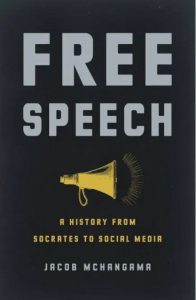 benefited from the unprecedented advances in human affairs brought about by the 2,500 years of this counterintuitive, revolutionary, and deeply consequential idea must resist the impulse of free speech entropy and contribute to keeping alive a vibrant culture of free speech, based on tolerance. Real tolerance requires understanding. Understanding comes from listening. And listening presupposes speech.
benefited from the unprecedented advances in human affairs brought about by the 2,500 years of this counterintuitive, revolutionary, and deeply consequential idea must resist the impulse of free speech entropy and contribute to keeping alive a vibrant culture of free speech, based on tolerance. Real tolerance requires understanding. Understanding comes from listening. And listening presupposes speech.
AHA Foundation: Are you optimistic about the future of free speech?
Jacob Mchangama: In the short run I think things will get worse with the climate for free speech deteriorating further globally. In the long run, I’m more optimistic. The culture of free speech is still alive and events in Russia and Ukraine and the rise of China make it clear that the fundamental dividing line between free and closed societies is whether free speech thrives or not. Hopefully, this will serve as a wake-up call for those who out of good intentions wish to limit free speech in open societies.


